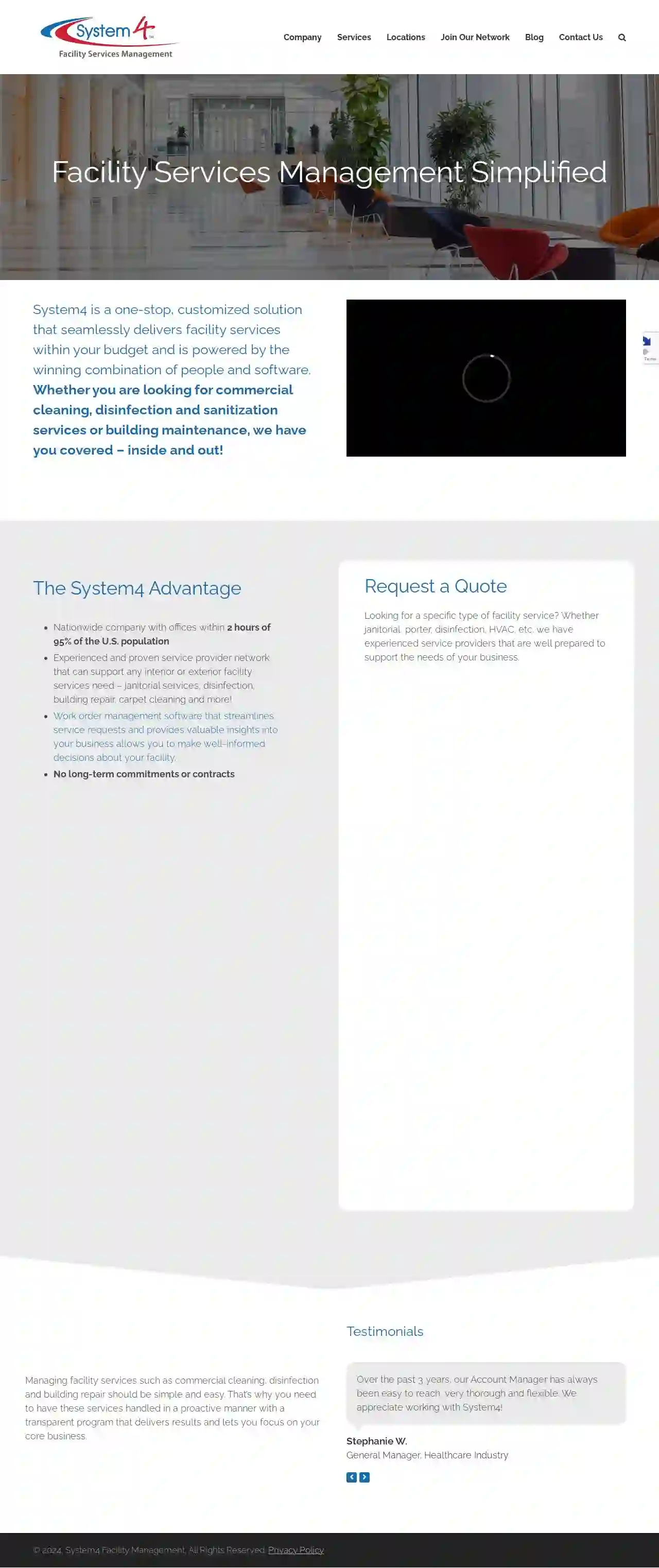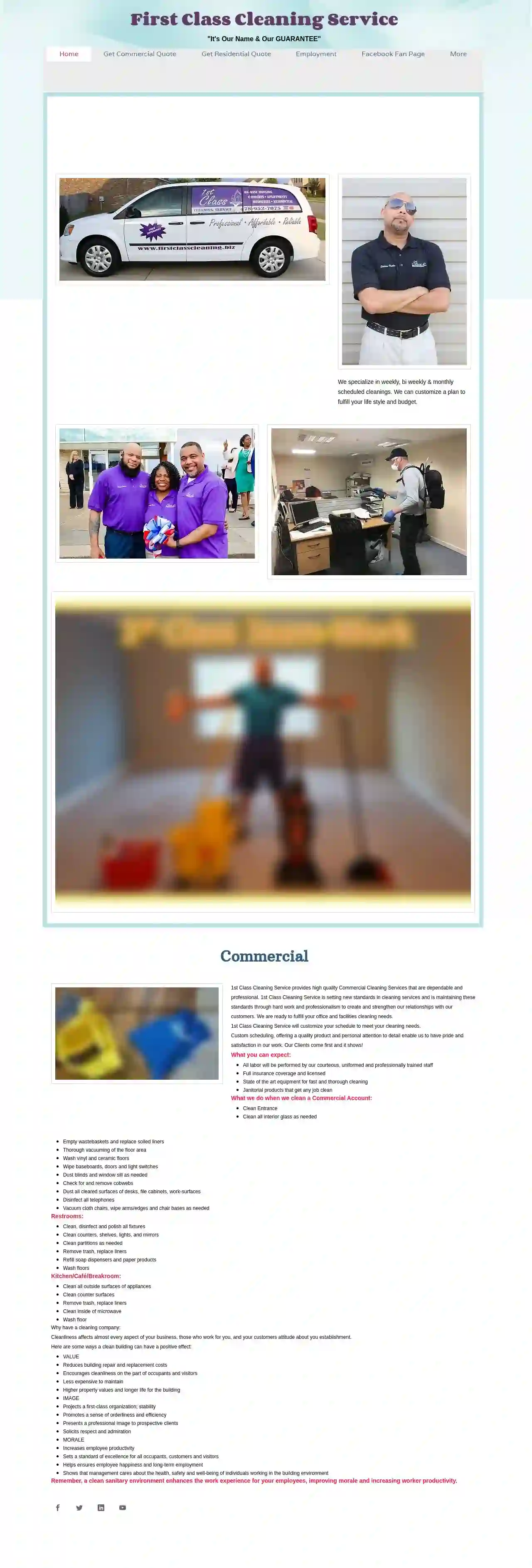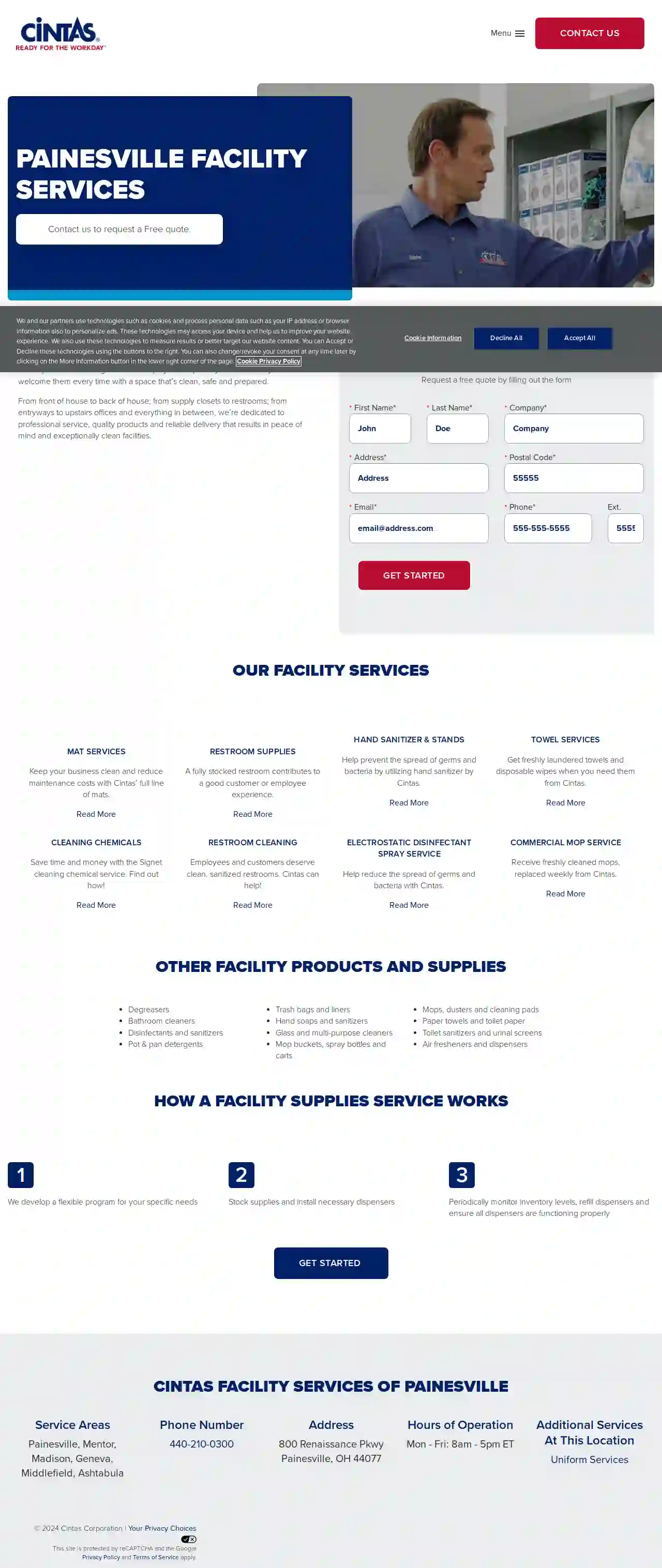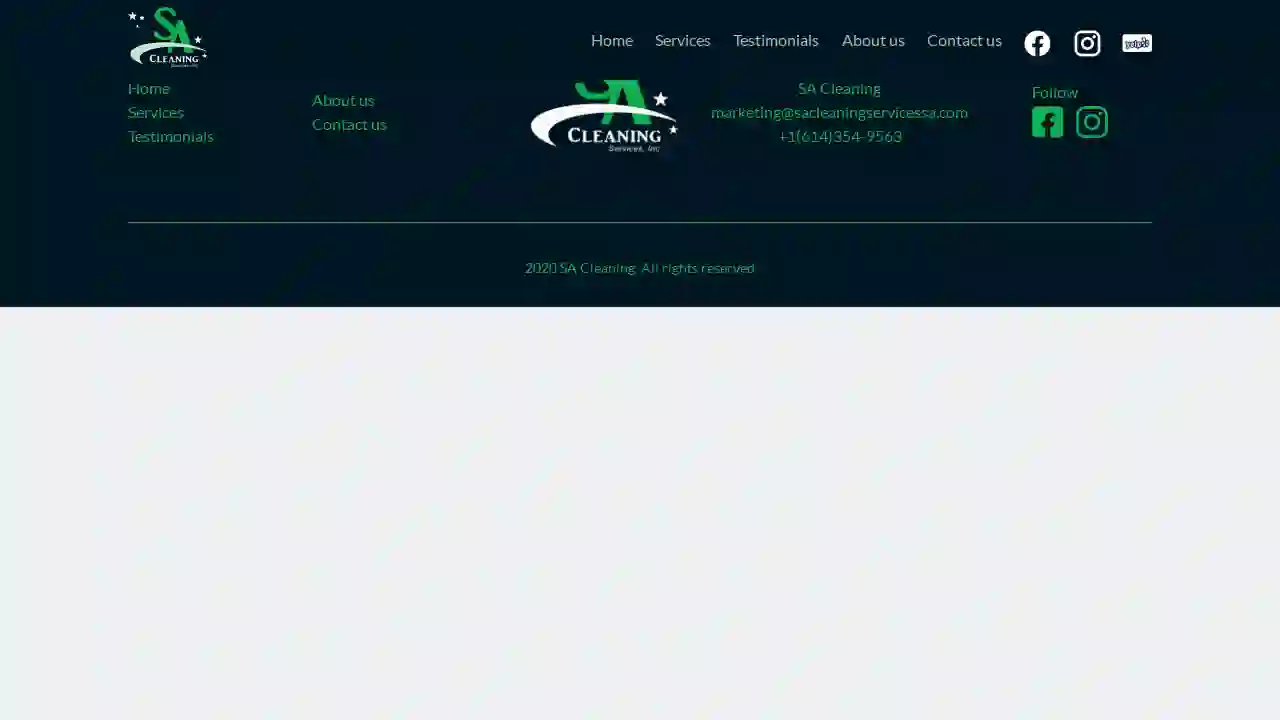Cleaning Services Cartersville
Find the best Local Cleaners in Cartersville
Get 3 FREE Cleaning Companies quotes for your project today! Compare profiles, reviews, accreditations, portfolio, etc... and choose the best deal.
Service Needed
City or Town

J & J Commercial Cleaning Services Inc
51 reviewsGainesville, US- Services
- Why Us?
Get Quote
A Personal ELF
4.7158 reviewsGainesville, US- Services
- Why Us?
Get Quote
System4 Corporate Headquarters
11 reviewsColumbus, US- Services
- Why Us?
- Gallery
Get Quote
1st Class Cleaning Service
43 reviewsMacon, US- Services
- Why Us?
Get Quote- Ch
Choice Cleaners
4.213 reviewsMacon, US- Services
- Why Us?
Get Quote 
ACS - AMERICA CLEANING SOLUTION
57 reviewsAtlanta, US- Services
- Why Us?
Get Quote
Hoodz of Columbia
3.77 reviewsAugusta, US- Services
- Why Us?
Get Quote- Ke
KeRoc Cleaning Services
531 reviewsColumbus, US- Services
- Why Us?
Get Quote 
Cintas Facility Services
4.329 reviewsColumbus, US- Services
- Why Us?
Get Quote
SA Cleaning Services, Inc
51 reviewsColumbus, US- Services
- Why Us?
Get Quote
Over 60,241+ Cleaning Companies onboarded
Our janitorial pros operate in Cartersville and beyond!
CleaningMatch has curated and vetted the Best Cleaning Services in Cartersville. Find a top & reliable business today.
Frequently Asked Questions About Cleaning Services
Find answers to common questions about cleaning services and hiring cleaning companies in the USA.
- Declutter Regularly: Set aside time regularly to declutter your belongings. Donate, sell, or discard items you no longer use or need.
- Designated Storage: Assign specific storage spaces for different items, such as shelves for books, drawers for clothes, and containers for toys.
- Labeling: Label storage containers and drawers to make it easy to find items and put them back in their designated places.
- 'One In, One Out' Rule: For every new item you bring into your home, get rid of an old one. This prevents clutter from accumulating.
- Vertical Storage: Utilize vertical storage solutions, such as shelves, wall organizers, and hanging racks, to maximize space.
- Digital Organization: Organize digital files and emails to reduce paper clutter. Use cloud storage services to free up space on your computer.
- Declutter first: Before cleaning, declutter surfaces and remove any items that don't belong. This makes cleaning easier and prevents distractions.
- Gather your supplies: Assemble all your cleaning supplies, including cleaners, cloths, sponges, and a trash bag, in a caddy or bucket to avoid wasting time searching for them.
- Work from top to bottom: Start cleaning from the top of each room and work your way down to prevent dust and debris from falling on already cleaned surfaces.
- Focus on high-traffic areas: Pay extra attention to high-traffic areas like kitchens and bathrooms, where dirt and germs accumulate quickly.
- Use the right tools: Utilize appropriate cleaning tools for different surfaces and tasks. Microfiber cloths are effective for dusting and cleaning glass, while scrub brushes are ideal for tough stains.
- Clean in sections: Break down larger tasks into smaller sections to avoid feeling overwhelmed. Focus on one area at a time before moving on to the next.
- Establish a routine: Create a regular cleaning schedule and stick to it. This prevents dirt buildup and makes cleaning more manageable.
- Ventilation: Open windows and turn on the exhaust fan to improve air circulation.
- Declutter: Remove any items from countertops, the shower, and the floor to allow easy access.
- Pre-treat: Spray shower walls, tub, and toilet bowl with bathroom cleaner and let it sit for a few minutes to break down grime.
- Toilet: Scrub the toilet bowl with a toilet brush, paying attention to the rim and under the seat. Wipe down the exterior of the toilet with a disinfectant wipe.
- Shower/Tub: Scrub the shower walls and tub with a sponge or scrub brush. Rinse thoroughly.
- Sink: Clean the sink with a sponge or cloth and bathroom cleaner. Pay attention to the faucet and drain.
- Mirrors and Glass: Wipe down mirrors and glass surfaces with a glass cleaner and a microfiber cloth for a streak-free finish.
- Floors: Sweep or vacuum the floor, then mop with a floor cleaner designed for your bathroom floor type.
- Finishing Touches: Empty the trash can, replace towels, and put away any toiletries.
Do I need to provide cleaning supplies for the cleaning service?
Most professional cleaning services provide their own cleaning supplies and equipment, including vacuums, mops, cleaning solutions, and microfiber cloths. However, it's always best to confirm this with the company before hiring them.
If you have specific preferences for cleaning products, such as eco-friendly or hypoallergenic options, communicate those to the cleaning service. They may accommodate your requests or allow you to provide your preferred supplies.
If you have specific preferences for cleaning products, such as eco-friendly or hypoallergenic options, communicate those to the cleaning service. They may accommodate your requests or allow you to provide your preferred supplies.
What are some tips for keeping my home organized and clutter-free?
Maintaining an organized and clutter-free home can be challenging, but these tips can help:
By adopting these strategies, you can create a more organized and clutter-free home, promoting a sense of calm and efficiency.
By adopting these strategies, you can create a more organized and clutter-free home, promoting a sense of calm and efficiency.
What are some tips for cleaning my own home efficiently?
Cleaning your home efficiently can save time and effort. Follow these tips to streamline your cleaning routine:
By implementing these strategies, you can clean your home more efficiently and maintain a cleaner and healthier living space.
By implementing these strategies, you can clean your home more efficiently and maintain a cleaner and healthier living space.
What is the best way to clean a bathroom?
Cleaning a bathroom effectively involves targeting key areas and using the right cleaning products. Here's a step-by-step guide:
By following these steps, you can maintain a clean and hygienic bathroom.
By following these steps, you can maintain a clean and hygienic bathroom.
Do I need to provide cleaning supplies for the cleaning service?
Most professional cleaning services provide their own cleaning supplies and equipment, including vacuums, mops, cleaning solutions, and microfiber cloths. However, it's always best to confirm this with the company before hiring them.
If you have specific preferences for cleaning products, such as eco-friendly or hypoallergenic options, communicate those to the cleaning service. They may accommodate your requests or allow you to provide your preferred supplies.
If you have specific preferences for cleaning products, such as eco-friendly or hypoallergenic options, communicate those to the cleaning service. They may accommodate your requests or allow you to provide your preferred supplies.
What are some tips for keeping my home organized and clutter-free?
Maintaining an organized and clutter-free home can be challenging, but these tips can help:
By adopting these strategies, you can create a more organized and clutter-free home, promoting a sense of calm and efficiency.
- Declutter Regularly: Set aside time regularly to declutter your belongings. Donate, sell, or discard items you no longer use or need.
- Designated Storage: Assign specific storage spaces for different items, such as shelves for books, drawers for clothes, and containers for toys.
- Labeling: Label storage containers and drawers to make it easy to find items and put them back in their designated places.
- 'One In, One Out' Rule: For every new item you bring into your home, get rid of an old one. This prevents clutter from accumulating.
- Vertical Storage: Utilize vertical storage solutions, such as shelves, wall organizers, and hanging racks, to maximize space.
- Digital Organization: Organize digital files and emails to reduce paper clutter. Use cloud storage services to free up space on your computer.
By adopting these strategies, you can create a more organized and clutter-free home, promoting a sense of calm and efficiency.
What are some tips for cleaning my own home efficiently?
Cleaning your home efficiently can save time and effort. Follow these tips to streamline your cleaning routine:
By implementing these strategies, you can clean your home more efficiently and maintain a cleaner and healthier living space.
- Declutter first: Before cleaning, declutter surfaces and remove any items that don't belong. This makes cleaning easier and prevents distractions.
- Gather your supplies: Assemble all your cleaning supplies, including cleaners, cloths, sponges, and a trash bag, in a caddy or bucket to avoid wasting time searching for them.
- Work from top to bottom: Start cleaning from the top of each room and work your way down to prevent dust and debris from falling on already cleaned surfaces.
- Focus on high-traffic areas: Pay extra attention to high-traffic areas like kitchens and bathrooms, where dirt and germs accumulate quickly.
- Use the right tools: Utilize appropriate cleaning tools for different surfaces and tasks. Microfiber cloths are effective for dusting and cleaning glass, while scrub brushes are ideal for tough stains.
- Clean in sections: Break down larger tasks into smaller sections to avoid feeling overwhelmed. Focus on one area at a time before moving on to the next.
- Establish a routine: Create a regular cleaning schedule and stick to it. This prevents dirt buildup and makes cleaning more manageable.
By implementing these strategies, you can clean your home more efficiently and maintain a cleaner and healthier living space.
What is the best way to clean a bathroom?
Cleaning a bathroom effectively involves targeting key areas and using the right cleaning products. Here's a step-by-step guide:
By following these steps, you can maintain a clean and hygienic bathroom.
- Ventilation: Open windows and turn on the exhaust fan to improve air circulation.
- Declutter: Remove any items from countertops, the shower, and the floor to allow easy access.
- Pre-treat: Spray shower walls, tub, and toilet bowl with bathroom cleaner and let it sit for a few minutes to break down grime.
- Toilet: Scrub the toilet bowl with a toilet brush, paying attention to the rim and under the seat. Wipe down the exterior of the toilet with a disinfectant wipe.
- Shower/Tub: Scrub the shower walls and tub with a sponge or scrub brush. Rinse thoroughly.
- Sink: Clean the sink with a sponge or cloth and bathroom cleaner. Pay attention to the faucet and drain.
- Mirrors and Glass: Wipe down mirrors and glass surfaces with a glass cleaner and a microfiber cloth for a streak-free finish.
- Floors: Sweep or vacuum the floor, then mop with a floor cleaner designed for your bathroom floor type.
- Finishing Touches: Empty the trash can, replace towels, and put away any toiletries.
By following these steps, you can maintain a clean and hygienic bathroom.